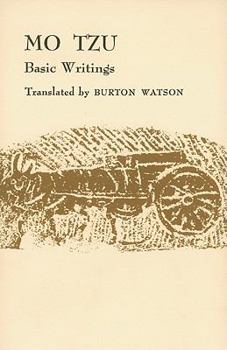Mo Tzu: Basic Writings
Select Format
Select Condition 
Book Overview
Mozi (fifth century B.C.) was an important political and social thinker and formidable rival of the Confucianists. He advocated universal love--his most important doctrine according to which all... This description may be from another edition of this product.
Format:Paperback
Language:English
ISBN:0231086083
ISBN13:9780231086080
Release Date:April 1963
Publisher:Columbia University Press
Length:140 Pages
Weight:0.45 lbs.
Dimensions:0.5" x 5.1" x 7.9"
Grade Range:Postsecondary and higher
Customer Reviews
3 ratings
Mo-tzu:Great Philosopher or intellectual guerrilla?
Published by Thriftbooks.com User , 19 years ago
The book on the philosophy of Mo-tzu was interesting at first.His views against aggresive warfair,against expensive funerals,and choosing worthy people are all right. As for his views against music and on ghosts are debatable. And on universal brotherhood may sound good but a bit too unrealistic even though well meaning. But what really got my goat was his cruel,false and mallicious attacks against Confucius and his followers.He tells false stories about Confucius that scholars say didn't exist. He makes him look like the essence of evil. Perhaps Mo-Tzu should be called "The Jealous Rival of Confucius!
An intersting doctrine
Published by Thriftbooks.com User , 19 years ago
Mo Tzu was a really extraordinary fellow. He was deeply concered with human welfare, and preached a doctrine of universal love. Mo Tzu wwas the kind of guy who would really be against anything that wasted resources that would be better used to meet people's needs. For instance, he would have hated the expensive and elaborate George W. Bush inaguration ceremnoy, and would have probably said that the money should have instead been used to support people affected by the tsunami. In the Mo Tzu, we read of Mo Tzu's ideas on universal love, and his attack on things like elaborate burial ceremonies. It is intersting to note how Mo Tzu's philosophy was increidbly popular in Acinet China for a while, and along with Concfucianims formed the two "orthodox" schools of philosophy. (Taoism was really in a category of its own). Burton Watson is an outstanding translator. However, my qualm with his translation is that it is by no means the complete text--which is really dispaointing. Nevertheless, I still recomend thius book.
A unique voice from Chinese history
Published by Thriftbooks.com User , 20 years ago
In fact, according to the translator's notes, the voice is so distinct from other Chinese tradition that some claimed Mo Tzu was not Chinese at all. Mo Tzu's philosophy was based on universal love, treating everyone with the respect due to one's family. In Confucian China, this was a radical and subversive notion. It undermined the traditional notions of filial piety, even social hierarchy, since it eliminated the special status of one's own parents in the web of personal relationships. He compounded the breach of filial piety by insisting on small, inexpensive funerals and brief mourning periods, also in the name of universal love. Mo Tzu believed completely in the spirits of the dead and in honoring them properly. He believed even more strongly in supporting "the people," usually meaning the farming classes. Confucian funeral garb, coffins, and rituals inflicted staggering costs, and harsh mourning practices literally endangered the mourner's health. Mo's utilitarian philosophy required that wealth be used to meet the needs of the living, since the dead could not use it. Utilitarianism also argued that mourners should return to normal, productive life as soon as possible, without risking the strength needed for their livelihood. Most surprisingly, Mo Tzu's universal love justified the militia composed of his followers. Mo Tzu held that the small and weak were of equal standing with the large and strong, and that bullying (or invading) of the weak was unjust. He backed his notion of justice with arms, coming to the defense to small states when unjustly attacked by the larger. Historically, Mo taught after Confucius (who is treated to special excoration in Mo's text) but before Mencius (who in turn attacks Mo). Mo appears to have been well known down to the current time, even if his actual influence on Chinese history was minor. I wonder, though - his drab utilitarian outlook may eventually have been informed Maoist policy. This is a brief and enjoyable addition to any set of Eastern classics. It's divergence from the main stream of Chinese philospohical history makes it especially interesting, since it provides contrast to the better-known thinkers. Perhaps Mo Tzu isn't for every reader, but the serious student is sure to enjoy it. //wiredweird PS: This appears to be the same material as Watson's "Mozi" (ISBN 0231130015). The only difference seems to be the romanization, the convention for English spellings, used in the two books.





